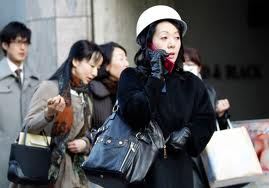Recently Japan came under the fold of manifold Tsunamis , earth splitting earthquakes and the most disasterous of all – the Nuclear Spill. The damage is still being gauged. Some say that it – at the end of its course ; will be as catastrophic as the Chernobyl Debacle.

But there are many differences between the Chernobyl incident and The Japanese one. The foremost being ; the Japanese are upfront and were somewhat on their guard. Let us look at some aspects of this ; from which we can take a feather and plant it in our bare hats.
1. The Calm they Projected : Not a single chest beating and wailing individual was to be seen. Instead the collective sorrow has been subtly transmitted to the hearts of billions around the globe and it was not without effect. Many did come forward to lend a helping hand.
2. [/b]The Dignity they followed[/b] : As is seen in our country ; there wasn’t a rat race for grocery , water and medical supplies – in case of a disaster. All the queues were well coordinated and there was no accounts of stampedes.[/b]
3. [/b]The Safety measures in Architecture[/b] : they have evolved many useful technologies to cope with the frequent quakes. Even the most potent of disasters ever recorded in the history ; didn’t raze many of the buildings in Japan. They swayed and didn’t fall as if complementing the people that resided inside them. [/b]
4. [/b]The Graciousness and frugality[/b] – People only took what they wanted and left enough for the others behind them. This spirit was helpful in enabling the authorities to get the people supplies in time for their sustenance as the pressure on the chain was considerably lower.[/b]
5. [/b]The Unspoken Law [/b]: Most of the hit –regions did not see any shops being looted or houses being burgled. There was no rapid horns buzzing on the roads , and no urgency to overtake the others. Just compassion and understanding.
6. [/b]The Martyrs [/b]– More than 50 workers from the FUKUSHIMA nuclear power plant stayed back and vigorously pumped water into the reactor core. If not for them the magnitude of the disaster would have been much more adverse. if we compare that to the situation in India ; the workers in Kalpakkam plant were kept in the dark and asked to do the same job – without being informed that they would definitely not live long after the assignment. They were illiterate people – eager to make a quick buck or follow the lead of their superior. There is a reason that Linguists argued time and again that “Mankind” is not appropriate to refer to humans ; “Humanity” is !
7. [/b]The Benevolence[/b]: restaurants offered food for as many people as they could for the minimal price to run their equipment and the cost of materials. Monetization took a backseat as the real spirit of – bushido was seen in action.[/b]
8. [/b]Disaster drills[/b] – In Japanese schools , there is a feature of teaching every child the skill to keep them safe from peril – right from kindergarten. This extensive training enabled them to know what to do and when to do it when the tempest took its toll. [/b]
9. [/b]The Media [/b]: They showed magnificent restraint in not sensationalizing the aftermath of the disaster. A sensitive and rational point of view was adopted. Even foreign journalists were prompted not to make a popcorn show out of it. If we see the Indian media in light of that ; they don’t even leave rape victims alone – natural disasters are like Jalebis –hot from the frying pan.
